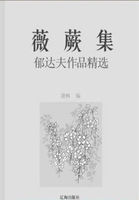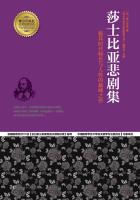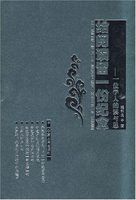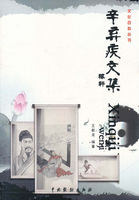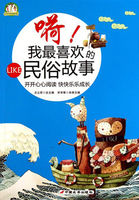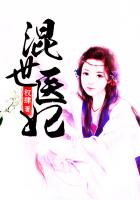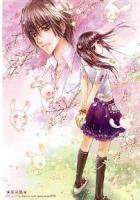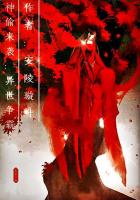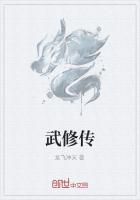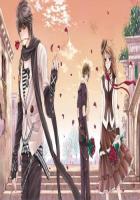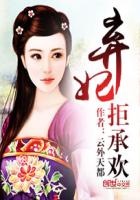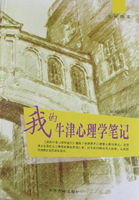For the Sake of“Doodley-squat”:Cruelty Behind the Hamburger in Breakfast of Champions
From the author's“preface”to the book, we understand that Breakfast of Champions, or Goodbye Blue Monday(1973)is a book that the author intends to write“childishly”and“impolitely”。 It is illustrated with graffti and simplistic, provoking line drawings of such matters as the American national fag, the Nazi fag, underpants, assholes, and even a“wide-open beaver”—a woman's vagina(BC 23)。By so doing, he is to“clear my head of all the junk in there”which“other people have put into my head”and which“do not fit together nicely, are often useless and ugly, are out proportion with one another, and out of proportion with life as it really is outside my head”(BC 5)。Written around 1972,the book is meant to be a gift for his fftieth birthday, and he is very aware that he has reached the summit of his writing career and is“crossing the spine of a roof, having ascended one slope”(Slaughterhouse-Five has just won him unprecedented success both critically and commercially)。He takes writing of the book as an act“to make my head as empty as it was when I was born onto this damaged planet fifty years ago”,as a“backward trip”until he comes to the date of his birth,“November eleventh, accidentally my birthday, was a sacred day called Armistice Day”(BC 6)。
For him, Armistice Day is asacred day because it is supposed to mark the end of war and the beginning of peace。Writing the novel back to a day honoring peace, Vonnegut is doing something like cleansing himself of all the dirt and pollution and start all over again。“I have no culture, no humane harmony in my brains。I can't live without a culture any one”(BC 5)。Therefore, for all the apparent vulgar contents, the bizarre narrative, and the postmodern metafictional tricks such as the authorial intrusion, the book is meant to be a relentlessly honest act of soul cleansing and social commentary。
Vonnegut indeed makes strong social commentaries in the novel:racial exploitation, sexual inequality, the middle-class coyness, and the hypocrisy and crudity of the American culture as a whole are all put under fre。 Of the most intense critique is the environmental destruction humans have created upon the Earth。Breakfast of Champions is the frst book in which Vonnegut talks explicitly and pointedly about the environment。This is a logical move for him in view of the rise of the Environmental Movement in the mid-1960s and his recent invitation to speak on the frst“Earth Day”in 1970.
Throughout the novel, the earth is referred to as“the wrecked planet”,“a planet that was dying fast”。 Kilgore Trout, the aging science fiction writer and Vonnegut's alter ego, daily talks to his pet, a parakeet named Bill, about“the end of the world”。He has a depressing childhood in Bermuda where he witnesses the death and extinction of the Bermuda Erns,“the largest creatures ever to fy under their own power on the planet”(BC 30)。The cause of the bird's extinction is discovered to be a fungus brought to their rookery by humans。He grows thus gloomily pessimistic about the future of the planet。He tells Bill,“humanity deserved to die horribly, since it had behaved so cruelly and wastefully on a planet so sweet”(BC 18)。
On his journey from New York through New Jersey, Philadelphia, and West Virginia, to Midland City, Ohio, where he is invited to speak on an arts festival, Kilgore Trout makes“the black humorist's revision ofTocqueville's passage”(Giannone 104)。 Only that instead of a panorama of a thriving new country that the young French philosopher saw, Trout presents to his readers a despairing picture of a world that is filthy and barren。
First are the poisoned marshes and meadows of New Jersey, where the driver on whose truck Trout hitchhikes used to be a hunter and fsherman long ago。“It broke his heart when he imagined what the marshes and meadows had been like only a hundred years before”(BC 84)。They are now poisoned by the flth and chemicals from manufacturing factories。Then the truck passes a bridge shrouded in smoke, ironically named for Walt Whitman。The truck driver self-critically remarks that his truck was turning the atmosphere into“poison gas”and he is“committing suicide”(BC 85)。Soon Trout fnds the truck rolling through West Virginia, whose surface“had been demolished by men and machinery and explosives in order to make it yield up its coal”(BC 119)。In this crude manner of strip mining, trees and topsoil go with the coal, and the landscape of the state is transformed into ugly holes and pits, which in turn leads to landslide and other disasters。When he fnally arrives in Midland City, Trout has to trudge barefooted across a river called Sugar Creek。While wading in the river, his feet become sheathed with a coat of mysterious, hard substance。It is waste from a local defense contractor, a byproduct of the antipersonnel bomb made for the Air Force。In this depiction, Sugar Creek is almost as bad as the Cuyahoga River in Ohio,“the river that caught fire”,which Trout mentions in his talk with the truck driver(BC 84)。
In a word, severe industrial pollution is everywhere in the novel。We see a most horrible picture of the literalized“wasteland”,a physical counterpart of the spiritual wasteland that the narrator describes in the preface of the book。
Making a comment after the truck driver complains about the replacement of fsh and game in the New Jersey marshes by the“shit that most of these factories make”,the narrator muses,“He had a point。 The planet was being destroyed by manufacturing processes, and what wasbeing manufactured was lousy, by and large”(BC 84)。Being a downright pessimist, Trout rejects conservationism, since he is certain that nothing can be done about the coming Armageddon:“I used to be a conservationist。I used to weep and wail about people shooting bald eagles with automatic shotguns from helicopters and all that, but I gave it up。[……]There's a nice conservation measure for you。That's God, not man。Just about the time we got our rivers cleaned up, he'd probably have the whole galaxy go up like a celluloid collar”(BC 84-5)。In such remarks, we see a Vonnegut exasperated by the human wastefulness and carelessness。Pessimistic as he is, there is actually more anger and sadness than despair。To him, humans have corrupted to a stage unpardonable to God。
The environmental destruction constitutes a central critique of the novel, that of the vulgarity, superficiality, fakery, and greediness of an industrial consumer culture。 People work like machines and robots;everybody is crazy to have more in possession of“doodley-squat”(a Vonnegutian coinage meaning big money)。To obtain“doodley-squat”,they can do anything and at the cost of anything and anybody's interest。Closely related to this culture is the newly rising fast-food culture。Of all the illustrations in the book, two are of fast food。One is the beef hamburger;the other is the Kentucky Fried Chicken。Coming along with the hamburger and the fried chicken are the illustrations of the animals from whom the food comes。Not only that, the narrator gives a detailed deion of the process as to how the food is made。As neither is very long, I quote them in full:
For the beef hamburger:
A hamburger was made out of an animal which looked like this:[the illustration of a full-grown cow]。
The animal was killed and grounded up into little bits, then shaped into patties and fried, and put between two pieces of bread。 The finished product looked like this:[the illustration of a beef hamburger]。(BC 124)
For the fried chicken:
A chicken was a flightless bird which looked like this:[illustration of a full-grown chicken]。
The idea was to kill it and pull out all its feather, and cut off its head and feet and scoop out its internal organs—and then chop it into pieces and fry the pieces, and put the pieces in a waxed paper bucket with a lid on it, so it looked like this:[illustration of a bucket of fried chicken drums]。(BC 157-8)
At first sight, these pictures and deions seem nonsensical and naive, since they are so common facts that such detailed explanations, given in the manner and tone of school children textbooks, only make them ludicrous。 Besides, the deive language is childishly simple, with most words monosyllabic and using“and”as connectives between all the verbs。However, upon further consideration, we can see profound meaning beneath the apparent childishness。First of all, Vonnegut selects very strong active verbs in describing the killing process of the animals, particularly with the chicken。It is a quick succession of ferce acts:“kill”,“pull out”,“cut off”,“scoop”,“chop”,“fry”,“put”。All are brisk, quick, active one-syllable words。All, except for“put”,denote specifc and precise meaning in the deion of the act。All suggest coldblooded cruelty and outrageous callousness。Besides, there is not the least mention of the receiver of the acts, as if instead of a living animal, the chicken is an insentient“thing”。
Secondly, in both the pictures and the deive words, there is a deliberate emphasis on both the connection and the contrast between the food and the living animal, as if it is something that needs to be called to mind。 The hamburger is made of cow, and the chicken drums are originally legs of a fightless bird。Isn't it ridiculous to repeat these associations?The answer is“No”。
According to David Nibert, it was only after WW Ⅱthat domestic beefconsumption arose in America。The postwar economic boom facilitated the increase, particularly in the form of“hamburgers”。New businesses were created, such as White Castle and McDonald’s。“By 1977,nearly 40 percent of‘beef’consumed in the United States was in the form of‘ground beef’”。Consumption of other animals as food also grew, especially in the latter half of the 20th century, through relentless advertising by agribusinesses。“Between 1950 and 1976,the US per capita consumption of‘beef’alone more than doubled, from 63.4 to 129.4 pounds annually。Profitable fast-food chains fourished as they promoted the growth and expansion of the‘hamburger culture’”(183)。
So Breakfast of Champions was written against a backdrop of increased meat consumption and the prosperity of a new hamburger culture。 This explains the abundant details about hamburgers and fast-food chain restaurants:the truck driver, who is a“big eater”,eats at a McDonald's。Dwayne Hoover, the other leading role in the novel besides Kilgore Trout, owns several Burger Chefs even though his main business is automobile deals。In an effort to ease Dwayne's suicidal depression and stress, his mistress suggests opening a Colonel Sanders Kentucky Fried Chicken franchise nearby the city prison, but unfortunately the suggestion arouses great resentment in Dwayne, who suspects that the woman is asking for an expensive gift。
This emergence of the burger culture and the drastic increase of meat consumption, however, were accompanied not by an intensified human-animal relationship, but its opposite:“people of the 20th century have spatially detached from the animals they consume and emotionally reluctant to recognize the embodied nature of meat foods”(Franklin 126)。 This is because traditional family-based husbandry was replaced by intensive, controlled, and industrialized livestock production。According to DeGrazia,“since the Second World War, factory farms—which try to raise as many animals as possible in very limited space in order to maximize profits—have driven three million American family farms out of business”(178)。
The era that Berger famously describes as when“a peasant becomes fond of his pig and is glad to salt away its pork”was over(1980:5)。As a matter of fact, as Adrian Franklin notes,“there are many tales of urban children in the late 20th century who did not know that meat came from animal sources or even what they looked like”(7)。Katherine C。Grier, author of a substantial study on pet-keeping in America, cites her own example when she writes about the lacking of knowledge,“As a child, I don't think that I ever considered the connection between hamburgers and cows, or bacon and pigs。The presentation of meat in paper trays covered with plastic in the markets where my mother shopped did not help clarify the relationship”(2)。She spent her childhood in the 1960s, about the time when Vonnegut wrote the book。In this sense, Vonnegut's emphasis of the connection between the food and the animal is not at all redundant or funny, but very necessary。
Defnitely, Vonnegut is not only satirizing people's loss of connection with animals。 In his seemingly comical representation of the food and the animal, he reminds readers of the blood and the suffering in the process of slaughtering。As the pictures of the food shows, the look of the food—two pieces of bread with neat-looking fried ground meat in between and fried parts of a chicken placed in a clean-looking waxed paper bucket—obscures the brutality of the killing and justifies the eating。As it were, there was a growing sensibility in the West since the 1960s about meat eating, either for health considerations or animal sentiments。In order to promote meat consumption, meat corporations invented new ways of presentation that disguise the animal sources of the meat。One of the changes was the size and package of the meat(Franklin 153-155)。As Peter Singer points out,“Buying food in a store or restaurant is the culmination of a long process, of which all but the end product is delicately screened from our eyes”(1990:95)。
By means of infantile simplicity and apparent jocularity, however, Vonnegut lays bare the connection between the food and the living animalsand the cruelty involved in the process of turning animals into food。 He mercilessly punctures the self-deceptive lie, in the same manner as he does in the novel the American lies that cover the European usurpation of the continent from the Indians and the racial oppression over the black people。He forces upon the reader the recognition of the human barbarity。As Sumner notes, the book's moment's brutality are meant to“jolt the reader into seeing familiar things in new ways, questioning the most mundane words and gestures for the(often toxic)baggage they carry”(150)。In this sense, Vonnegut goes one step earlier than Peter Singer in pointing out and tearing off the“verbal disguise”that helps cover“the origin of our food”(Singer 1990:96)。Two years after the publication of Breakfast of Champions, Singer published his ground-breaking book, Animal Liberation(1975),giving a full account of the brutality practiced on chickens, pigs, calves, cow, beef cattle, sheep, etc。on the animal farm。
The prosperity of hamburger industry means the death and suffering of a great number of animals。 According to Singer, over 100 million cows, pigs, and sheep are raised and slaughtered in the United States alone each year;and for poultry the fgure is a staggering 5 billion(1990:95)。All of these animals experience unimaginable misery in the short life before their fnal death:confnement, crowding, severe restriction of movement, deprivation of family, deprivation of means to meet basic instinctual needs(such as nesting, grooming, spreading the wings or stretching the legs, and sucking for baby animals),loneliness, boredom, fear, anxiety, and constant pain。Although Vonnegut makes no direct reference to the issue of animal farming in Breakfast of Champions, he does mention it in a number of other books。In The Sirens of Titan(1952),for example, Rumfoord tells Constant that Constant and Beatrice will be bred by the Martians“like farm animals”(ST 26),meaning they will be treated very roughly on Mars, less than humans。In Hocus Pocus(1990),similarly, when the narrator and his wife sees three convicts issue out of a prison truck that is on fre, all of them inshackles and chains and under the shot guns of the guards, they both are seized with awe。The wife later describes the experience as“like seeing animals on their way to a slaughterhouse”(HP 79)。In Jailbird(1979),a group of foreign workmen are described as a herd of farm animals:“They slept on the train。They ate on the train。They allowed themselves to be herded like docile cattle between the mansion and the train”(J 97)。
As a matter of fact, an almost identical deion had already appeared in Slaughterhouse-Five(1969),in the deion of the conditions of the American prisoners in the boxcars of the train。Therefore, Vonnegut is surely aware of the situation of the farm animals of the 1960s and 1970s and must have agreed with the animal welfare activists that it is one of the worst conditions of existence on earth。The comparison of prisoners and workmen to farm animals shows Vonnegut's insight of the analogous condition of racism, classism, and speciesism, an insight that actually preceded even Peter Singer's introduction of the term“speciesism”。
In Breakfast of Champions, his disapproval of the craze for hamburger and meat consumption is implied。 When Trout stops with the truck driver at the McDonald's, he orders only a coffee。Even though the reason he gives is that he has little money on him, he literally abstains from eating hamburgers。There is also a true vegetarian in the novel—Bunny Hoover, the estranged son of Dwayne Hoover, a pale, quiet, and kind young man。He was sent by his father to a military school when he was only ten, because“he told Dwayne that he wished he were a woman instead of a man, because what men did was so often cruel and ugly”(BC 180)。Accused of homosexual behavior, Bunny is dispatched by the army and his father refuses to exchange words with him。He lives in an area for the homeless and lonely,“Skid Row”,and leads a simple life—“fruits and vegetables were all he ate, and he munched them raw”。Vonnegut makes a special emphasis that“[h]e not only did without dead meat—he did without living meat too, without friends or lovers or pets”(BC 177)。Vonnegut'sportrayal of Bunny is full of empathy and love, presenting him as a pure, delicate, and vulnerable young man。He becomes the first victim when his schizophrenic father runs amok at the arts festival dinner, beating everybody up as robots and machines。
Another direct address of the issue of human-animal relationship is made in the character of Martha Simmons, wife of a County Commissioner of Public Safety in Midland City。 The deion of her is unusually tender and respectful for the crude style of the book。A reader of Albert Schweitzer, Martha treats simpler animals with love。While trying to rescue a sick bat clinging on her foor-to-ceiling draperies, she contracted rabies and dies of it。The death of such a loving character is perplexing, but the deion of the unnatural environment gives a hint for the cause of this tragedy。“The bat nipped her ever so slightly as she wrapped it in Kleenex, a face tissue。She carried it out onto her Patio, where she laid it gently on a form of artificial grass known as Astro-turf”(BC 266)。Both the face tissue and the grass apparently signify artificiality and the prevalence of consumerism, as both have famous brand names。Out of its natural habitat and trapped in a completely artificial environment, the bat can hardly have any other destiny but to become sick and die, just like the fshes in Dwayne's Sacred Miracle Cave that turn belly-up and go extinct due to the pollution of the underground water。Similarly, Martha's defenseless, well-meaning effort to rescue the sick bat leads only to her innocent death。The tragic story of Martha Simmons is therefore an allegorical lesson warning of the vicious cycle that is caused by the industrial culture and human carelessness in their maniac grabbing of“doodley-squat”。

